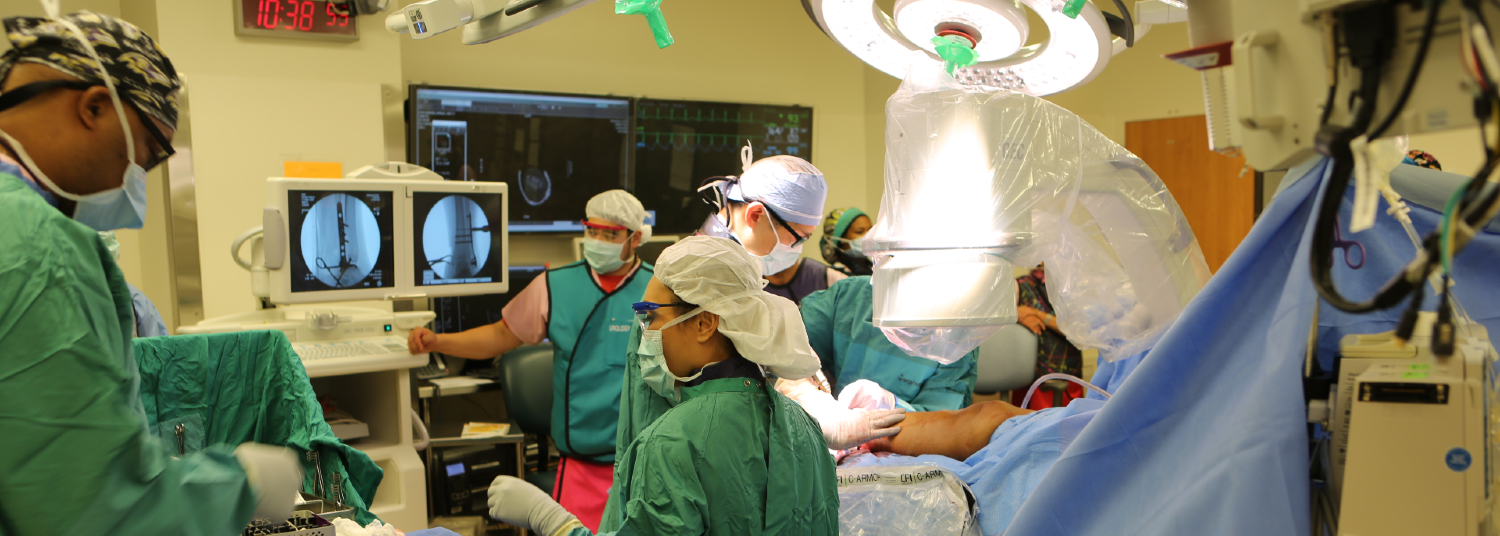ACS Curriculum
ACS Rotation Schedule
| Rotation | Duration |
|---|---|
| Trauma | 8 weeks |
| Emergency General Surgery | 4 weeks |
| Soft Tissue Surgery | 4 weeks |
| Vascular Surgery | 4 weeks |
| Trauma Endovascular Surgery | 4 weeks |
| Capital Region (Trauma/EGS Surgery) | 9 weeks |
| Thoracic/Cardio Thoracic Surgery | 4 weeks |
| International Rotation | 4 weeks |
| Hepatobiliary Surgery | 4 weeks |
| Administrative | 3 weeks |
| Vacation | 3 weeks |
| EAST Conference | 1 week |
Rotation Objectives
Trauma
Objectives
- Development of knowledge and skills relating to care of the acutely injured patient, with a special focus on priorities in multi-system trauma and complex penetrating trauma.
- Specific emphasis on the appropriate treatment of patients in severe hemorrhagic shock, determination of adequacy of resuscitation, and decision-making regarding operative intervention for treatment of abdominal, thoracic, and vascular traumatic injury versus non-operative management with angiographic embolization.
- Fellows will also gain experience in triage priorities with multiple trauma admissions.
Emergency General Surgery
Objectives
- Development of knowledge and skills relating to care of the acutely ill general surgery patient, with a special focus on priorities in abdominal and gastrointestinal surgery problems.
- Acquire the technical proficiency in performing emergent surgical procedures techniques in abdominal, thoracic and extremity EGS.
Soft Tissue Surgery
Objectives
- Learn and develop additional expertise in the management of patients with complex soft tissue infections including necrotizing fasciitis, mixed aggressive soft tissue infections, Fournier’s gangrene and other infections and wounds.
- The rotation provides additional experience in the indication for, and role of, hyperbaric oxygen therapy.
Vascular Surgery
Objectives
The overall goal of the vascular surgery rotation at UMBWMC is to develop our trainees into expert clinicians, proficient in all aspects of the diagnosis, management, and treatment of vascular diseases. These goals are fostered in an environment of progressively graded clinical and operative experience and responsibility. Within the limits of variability found in a clinical practice, an equivalent experience will be afforded each fellow, under the guidance and supervision of qualified teaching staff and Board-Certified Vascular Surgeons. In so doing the fellow will exercise mature surgical judgment and operative skills which prepare him/her to provide independent care to patients with vascular disease.
The vascular surgery rotation at UMBWMC for Acute Care Surgery Fellows involves:
- Ambulatory and inpatient evaluation and management of vascular patients
- Development of diagnostic skills, as well as experience with endovascular and open vascular surgical skills
- Training within the non-invasive vascular diagnostic laboratory.
- During the rotation, training focuses on the honing of skills acquired along with management of patients requiring more complex, open, and endovascular surgical procedures.
Trauma Endovascular Surgery
Objectives
- To provide a month’s exposure to basic and endovascular and vascular surgical treatment of injury as well as hemorrhage control in the acute care and emergency surgical patient.
- Fellows will participate in all activities of the service, which include the evaluation of patients, operative planning, intraoperative decision-making, and postoperative care. The last include outpatient surveillance and follow-up visits.
Broadly, the goal is for the fellow to leave with an understanding of what the indications are for vascular and endovascular intervention, what modalities are available to treat the patient, and, most importantly, the post-procedural consequences of intervention. Once in practice, this will allow the trauma and emergency general surgeon to communicate effectively with vascular surgery and interventional radiology services in a way that conveys the greater clinical situation of any given patient; this, in turn, will introduce clinical reasoning into what is often regarded as a purely technical endeavor. It will also improve the collaborative aspect of any interventional or vascular surgical consultation.
Capital Region-Trauma/EGS
Objectives
- To provide the fellows with a comprehensive exposure experience in trauma and emergency general surgery at a high-volume, limited resources Level-II trauma center.
- Specific emphasis on the appropriate treatment of patients in severe hemorrhagic shock, determination of adequacy of resuscitation, and decision-making regarding operative intervention for treatment of abdominal, thoracic and vascular traumatic injury versus non-operative management with angiographic embolization.
- Fellows will also gain experience in triage priorities with multiple trauma admissions.
- Additionally, the fellows are expected to develop the knowledge and skills relating to care of the acutely ill general surgery patient, with a special focus on priorities in abdominal and gastrointestinal surgery pathology.
Thoracic and Cardio-Thoracic Surgery
Objectives
- Development of knowledge and skills relating to care of the thoracic surgery patient, with a special focus on acute problems of the chest wall, esophagus, lung, and diaphragm.
International Rotation
Objectives
This international trauma experience is designed to provide the ACS fellows with training in a resource-limited, high volume trauma center and to aid in the development of knowledge and skills relating to care of the acutely injured patient, with a special focus on priorities in multi-system trauma and complex penetrating trauma.
- Specific emphasis on the appropriate treatment of patients in severe hemorrhagic shock, determination of adequacy of resuscitation, and decision-making regarding operative intervention for treatment of abdominal, thoracic, and vascular traumatic injury versus non-operative management with angiographic embolization.
- Fellows will also gain experience in triage priorities with multiple trauma admissions.
Hepatobiliary Surgery
Objectives
- The goal of the rotation is to provide the fellow with a better understanding of hepatobiliary and vascular anatomy and the technical skills needed for the management of hepatic trauma.
ACS Didactics Schedule
Acute Care Surgery Didactics Schedule
| Monthly ACS Fellow Didactics | |
|---|---|
| ACES Research Meeting | 2nd Tuesday/month |
| ACES Faculty Meeting | 3rd Tuesday/month |
| Multidisciplinary Pancreatitis Meeting | 3rd Thursday/month |
| ACS Fellow Education | Monthly |
| ACS Fellow Mentor Education Dinner | Monthly |
| AAST Meet the Mentors | Monthly |
| AAST Journal Club | Monthly |
| ACES M&M | Last Wednesday/Month |

